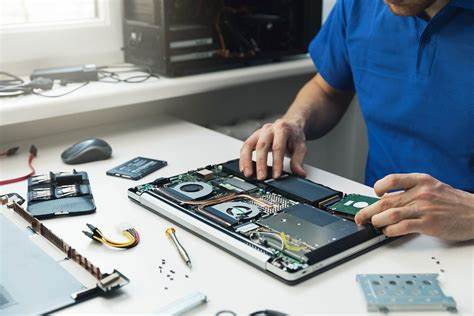In today’s digital world, computers are essential tools for work, communication, entertainment, and more. However, just like any other piece of technology, they can experience problems. Whether it’s a slow system, hardware failure, or a virus infection, repair services can help you get your device back in working order. In this article, we’ll cover the different types of computer repair services, when to seek professional help, and how to maintain your computer to prevent issues.
1. Common Types of Computer Repair Services
Computer repair services cover a wide range of issues, from basic troubleshooting to advanced hardware repairs. Here are some of the most common services offered:
Hardware Repairs: These include fixing or replacing damaged components such as the hard drive, RAM, motherboard, power supply, or screen.
Software Troubleshooting: This involves diagnosing and resolving issues with your operating system, drivers, or software applications.
Virus and Malware Removal: Repair services can detect and remove viruses, malware, and other harmful software that slow down or damage your computer.
Data Recovery: If you accidentally delete files or experience hard drive failure, data recovery services can help retrieve lost information.
Operating System Reinstallation: Sometimes, reinstalling your operating system (Windows, macOS, etc.) is necessary to fix major software issues.
Networking and Connectivity Issues: Professionals can troubleshoot and resolve issues with your internet connection, router, or network setup.
2. When to Seek Professional Help
While some computer issues can be solved with DIY fixes, there are times when professional help is the safest and most effective option. Here are some scenarios where you should consider hiring a repair technician:
Hardware Failures: If your computer is making unusual noises, won’t power on, or experiences frequent crashes, it could be due to a hardware issue that needs expert attention.
Data Loss: Attempting to recover lost data yourself can sometimes cause further damage. A professional data recovery service can safely retrieve your files.
Virus Infections: While antivirus programs can handle minor threats, persistent malware or ransomware requires professional removal to ensure your system is secure.
Blue Screen of Death (BSOD): This dreaded error often points to a serious issue that requires expert diagnosis and repair.
Slow Performance: If your computer is running slower than usual and basic troubleshooting hasn’t resolved the issue, a technician can perform a full system check.
3. DIY Troubleshooting: What You Can Do Before Calling a Technician
There are some common computer problems that can often be fixed at home. Here are a few troubleshooting tips you can try before reaching out to a professional:
Reboot Your Computer: Sometimes, a simple restart can resolve software glitches and restore performance.
Many issues stem from outdated software or drivers. so you must check for updates
Run Antivirus Software: Use your antivirus software to scan for malware and viruses that could be affecting your system’s performance.
Clear Temporary Files: Over time, temporary files can slow down your system. Use tools like Disk Cleanup (Windows) or CleanMyMac (macOS) to free up space.
4. Choosing the Right Computer Repair Service
Not all computer repair services are created equal. Here are some factors to consider when choosing a repair provider:
Reputation: Look for reviews and testimonials from previous customers to gauge the service’s reliability and customer satisfaction.
Experience: Ensure the technicians are experienced in working with your specific type of computer, whether it’s a PC, Mac, or custom-built machine.
Warranty: A reputable service should offer warranties on their repairs, giving you peace of mind in case the problem recurs.
Pricing Transparency: Look for services that provide clear and upfront pricing with no hidden fees.
Turnaround Time: If you need your computer back quickly, inquire about the expected repair time to avoid long delays.
5. Preventive Maintenance: How to Avoid Common Computer Problems
Regular maintenance can extend the life of your computer and help you avoid costly repairs. Here are some simple steps to keep your system running smoothly:
Keep Your Software Updated: Regularly update your operating system, antivirus software, and other applications to protect against security vulnerabilities.
Use Antivirus Software: Protect your computer from malware by installing reliable antivirus software and running regular scans.
Clean Your Computer: Dust buildup inside your computer can cause overheating. Clean your vents and fans periodically to ensure proper airflow.
6. What to Expect During a Computer Repair
When you take your computer in for repair, here’s what you can generally expect:
Initial Diagnostic: The technician will perform a diagnostic to identify the root cause of the issue. This is often free or included in the service cost.
Repair Plan and Cost Estimate: Once the problem is identified, the technician will explain the repair process and provide a cost estimate.
Repair Time: Depending on the complexity of the issue, repairs can take anywhere from a few hours to several days.
Testing: After the repair is complete, the technician will test your computer to ensure everything is functioning properly before returning it to you.
7. The Future of Computer Repair Services
As technology continues to evolve, so do the challenges and solutions in computer repair. Some emerging trends in the industry include:
Remote Repair Services: With remote access tools, technicians can diagnose and fix software issues without needing to physically access your computer.
AI Diagnostics: Artificial intelligence is being integrated into diagnostic tools, allowing faster and more accurate identification of computer problems.
Conclusion:
Whether you’re facing a minor software glitch or a major hardware failure, professional computer repair services can save you time, money, and frustration. By understanding when to seek help, choosing the right provider, and maintaining your computer, you can keep your system running smoothly for years to come. Don’t hesitate to reach out to a trusted repair technician when you need assistance—your computer is an investment worth protecting!


